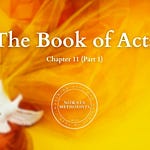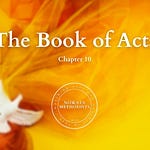Despite how patriarchal pretty much all kingdoms of the world have been, with some notable exceptions, there have also been, in almost every culture, exceptional empress dowagers. In previous weeks, we met Jezebel, who seems to have exercised great authority in the Northern Kingdom of Israel. This week we meet Athaliah, who is a bloodthirsty ruler of the Southern Kingdom of Judea. She is most fearsome. Some skeptically treat these texts, saying the report of these women is corrupted by insecure men who couldn’t stand to have a strong woman in charge. Given the ready availability of other strong female characters of great quality, I generally find this suspicion a bit…stupid. The scriptures are true. These are true reports. Worldly power has a way of corrupting both women and men, to great shame. The end is bloody. Neither Jezebel nor Athaliah have a good end.
The chapter of Proverbs we cover today happens to also deal with the theme of toxic femininity. Ancients have always known the corrosive effect that a faithless woman can have on a man. In my days of ministering to men in jail, the role of women was often a significant contributing factor in the dysfunction of these men. Many men were released right back into the arms of the very women who would again get them hooked on drugs and fighting with other competing suitors. Wisdom lies in finding a woman of integrity and chastity. It may seem old fashioned to preach such virtues. I choose to believe these are eternal virtues that bear fruits of peace and joy. And because the scriptures say so, I know it to be true. You should, too!
2 Kings 11
When Athaliah the mother of Ahaziah saw that her son was dead, she proceeded to annihilate all the royal heirs.
But Jehosheba daughter of King Joram, the sister of Ahaziah, took Joash son of Ahaziah and stole him away from among the sons of the king who were being murdered. She put him and his nurse in a bedroom to hide him from Athaliah, and he was not killed.
And Joash remained hidden with his nurse in the house of the LORD for six years while Athaliah ruled the land.
Then in the seventh year, Jehoiada sent for the commanders of hundreds, the Carites, and the guards, and had them brought into the house of the LORD. There he made a covenant with them and put them under oath.
He showed them the king’s son
and commanded them, “This is what you are to do: A third of you who come on duty on the Sabbath shall guard the royal palace,
a third shall be at the gate of Sur, and a third at the gate behind the guards. You are to take turns guarding the temple—
the two divisions that would go off duty on the Sabbath are to guard the house of the LORD for the king.
You must surround the king with weapons in hand, and anyone who approaches the ranks must be put to death. You must stay close to the king wherever he goes.”
So the commanders of hundreds did everything that Jehoiada the priest had ordered. Each of them took his men—those coming on duty on the Sabbath and those going off duty—and came to Jehoiada the priest.
Then the priest gave to the commanders of hundreds the spears and shields of King David from the house of the LORD.
And the guards stood with weapons in hand surrounding the king by the altar and the temple, from the south side to the north side of the temple.
Then Jehoiada brought out the king’s son, put the crown on him, presented him with the Testimony, and proclaimed him king. They anointed him, and the people clapped their hands and declared, “Long live the king!”
When Athaliah heard the noise from the guards and the people, she went out to the people in the house of the LORD.
And she looked out and saw the king standing by the pillar, according to the custom. The officers and trumpeters were beside the king, and all the people of the land were rejoicing and blowing trumpets.
Then Athaliah tore her clothes and screamed, “Treason! Treason!”
And Jehoiada the priest ordered the commanders of hundreds in charge of the army, “Bring her out between the ranks, and put to the sword anyone who follows her.” For the priest had said, “She must not be put to death in the house of the LORD.”
So they seized Athaliah as she reached the horses’ entrance to the palace grounds, and there she was put to death.
Then Jehoiada made a covenant between the LORD and the king and the people that they would be the LORD’s people. He also made a covenant between the king and the people.
So all the people of the land went to the temple of Baal and tore it down. They smashed the altars and idols to pieces, and they killed Mattan the priest of Baal in front of the altars.
And Jehoiada the priest posted guards for the house of the LORD.
He took with him the commanders of hundreds, the Carites, the guards, and all the people of the land, and they brought the king down from the house of the LORD and entered the royal palace by way of the Gate of the Guards.
Then Joash took his seat on the royal throne, and all the people of the land rejoiced. And the city was quiet, because Athaliah had been put to the sword at the royal palace.
Joash was seven years old when he became king.
2 Kings 12
In the seventh year of Jehu, Joash became king, and he reigned in Jerusalem forty years. His mother’s name was Zibiah; she was from Beersheba.
And Joash did what was right in the eyes of the LORD all the days he was instructed by Jehoiada the priest.
Nevertheless, the high places were not removed; the people continued sacrificing and burning incense there.
Then Joash said to the priests, “Collect all the money brought as sacred gifts into the house of the LORD—the census money, the money from vows, and the money brought voluntarily into the house of the LORD.
Let every priest receive it from his constituency, and let it be used to repair any damage found in the temple.”
By the twenty-third year of the reign of Joash, however, the priests had not yet repaired the damage to the temple.
So King Joash called Jehoiada and the other priests and said, “Why have you not repaired the damage to the temple? Now, therefore, take no more money from your constituency, but hand it over for the repair of the temple.”
So the priests agreed that they would not receive money from the people and that they would not repair the temple themselves.
Then Jehoiada the priest took a chest, bored a hole in its lid, and set it beside the altar on the right side as one enters the house of the LORD. There the priests who guarded the threshold put all the money brought into the house of the LORD.
Whenever they saw that there was a large amount of money in the chest, the royal scribe and the high priest would go up, count the money brought into the house of the LORD, and tie it up in bags.
Then they would put the counted money into the hands of those who supervised the work on the house of the LORD, who in turn would pay those doing the work—the carpenters, builders,
masons, and stonecutters. They also purchased timber and dressed stone to repair the damage to the house of the LORD, and they paid the other expenses of the temple repairs.
However, the money brought into the house of the LORD was not used for making silver basins, wick trimmers, sprinkling bowls, trumpets, or any articles of gold or silver for the house of the LORD.
Instead, it was paid to those doing the work, and with it they repaired the house of the LORD.
No accounting was required from the men who received the money to pay the workmen, because they acted with integrity.
The money from the guilt offerings and sin offerings was not brought into the house of the LORD; it belonged to the priests.
At that time Hazael king of Aram marched up and fought against Gath and captured it. Then he decided to attack Jerusalem.
So King Joash of Judah took all the sacred objects dedicated by his fathers—Jehoshaphat, Jehoram, and Ahaziah, the kings of Judah—along with his own consecrated items and all the gold found in the treasuries of the house of the LORD and the royal palace, and he sent them to Hazael king of Aram. So Hazael withdrew from Jerusalem.
As for the rest of the acts of Joash, along with all his accomplishments, are they not written in the Book of the Chronicles of the Kings of Judah?
And the servants of Joash rose up and formed a conspiracy and killed him at Beth-millo, on the road down to Silla.
His servants Jozabad son of Shimeath and Jehozabad son of Shomer struck him down, and he died. And they buried him with his fathers in the City of David, and his son Amaziah reigned in his place.
2 Kings 13
In the twenty-third year of the reign of Joash son of Ahaziah over Judah, Jehoahaz son of Jehu became king of Israel, and he reigned in Samaria seventeen years.
And he did evil in the sight of the LORD and followed the sins that Jeroboam son of Nebat had caused Israel to commit; he did not turn away from them.
So the anger of the LORD burned against Israel, and He delivered them continually into the hands of Hazael king of Aram and his son Ben-hadad.
Then Jehoahaz sought the favor of the LORD, and the LORD listened to him because He saw the oppression that the king of Aram had inflicted on Israel.
So the LORD gave Israel a deliverer, and they escaped the power of the Arameans. Then the people of Israel lived in their own homes as they had before.
Nevertheless, they did not turn away from the sins that the house of Jeroboam had caused Israel to commit, but they continued to walk in them. The Asherah pole even remained standing in Samaria.
Jehoahaz had no army left, except fifty horsemen, ten chariots, and ten thousand foot soldiers, because the king of Aram had destroyed them and made them like the dust at threshing.
As for the rest of the acts of Jehoahaz, along with all his accomplishments and his might, are they not written in the Book of the Chronicles of the Kings of Israel?
And Jehoahaz rested with his fathers and was buried in Samaria. And his son Jehoash reigned in his place.
In the thirty-seventh year of the reign of Joash over Judah, Jehoash son of Jehoahaz became king of Israel in Samaria, and he reigned sixteen years.
And he did evil in the sight of the LORD and did not turn away from all the sins that Jeroboam son of Nebat had caused Israel to commit, but he walked in them.
As for the rest of the acts of Jehoash, along with all his accomplishments and his might, including his war against Amaziah king of Judah, are they not written in the Book of the Chronicles of the Kings of Israel?
And Jehoash rested with his fathers, and Jeroboam succeeded him on the throne. Jehoash was buried in Samaria with the kings of Israel.
When Elisha had fallen sick with the illness from which he would die, Jehoash king of Israel came down to him and wept over him, saying, “My father, my father, the chariots and horsemen of Israel!”
Elisha told him, “Take a bow and some arrows.”
So Jehoash took a bow and some arrows.
Then Elisha said to the king of Israel, “Put your hand on the bow.”
So the king put his hand on the bow, and Elisha put his hands on the king’s hands.
“Open the east window,” said Elisha.
So he opened it and Elisha said, “Shoot!” So he shot.
And Elisha declared:
“This is the LORD’s arrow of victory,
the arrow of victory over Aram,
for you shall strike the Arameans in Aphek
until you have put an end to them.”
Then Elisha said, “Take the arrows!”
So he took them, and Elisha said to the king of Israel, “Strike the ground!”
So he struck the ground three times and stopped.
But the man of God was angry with him and said, “You should have struck the ground five or six times. Then you would have struck down Aram until you had put an end to it. But now you will strike down Aram only three times.”
And Elisha died and was buried.
Now the Moabite raiders used to come into the land every spring.
Once, as the Israelites were burying a man, suddenly they saw a band of raiders, so they threw the man’s body into Elisha’s tomb. And as soon as his body touched the bones of Elisha, the man was revived and stood up on his feet.
And Hazael king of Aram oppressed Israel throughout the reign of Jehoahaz.
But the LORD was gracious to Israel and had compassion on them, and He turned toward them because of His covenant with Abraham, Isaac, and Jacob. And to this day, the LORD has been unwilling to destroy them or cast them from His presence.
When Hazael king of Aram died, his son Ben-hadad reigned in his place.
Then Jehoash son of Jehoahaz took back from Ben-hadad son of Hazael the cities that Hazael had taken in battle from his father Jehoahaz. Jehoash defeated Ben-hadad three times, and so recovered the cities of Israel.
2 Kings 14
In the second year of the reign of Jehoash son of Jehoahaz over Israel, Amaziah son of Joash became king of Judah.
He was twenty-five years old when he became king, and he reigned in Jerusalem twenty-nine years. His mother’s name was Jehoaddan; she was from Jerusalem.
And he did what was right in the eyes of the LORD, but not as his father David had done. He did everything as his father Joash had done.
Nevertheless, the high places were not taken away, and the people continued sacrificing and burning incense on the high places.
As soon as the kingdom was firmly in his grasp, Amaziah executed the servants who had murdered his father the king.
Yet he did not put the sons of the murderers to death, but acted according to what is written in the Book of the Law of Moses, where the LORD commanded: “Fathers must not be put to death for their children, and children must not be put to death for their fathers; each is to die for his own sin.”
Amaziah struck down 10,000 Edomites in the Valley of Salt. He took Sela in battle and called it Joktheel, which is its name to this very day.
Then Amaziah sent messengers to the king of Israel Jehoash son of Jehoahaz, the son of Jehu. “Come, let us meet face to face,” he said.
But Jehoash king of Israel replied to Amaziah king of Judah: “A thistle in Lebanon sent a message to a cedar in Lebanon, saying, ‘Give your daughter to my son in marriage.’ Then a wild beast in Lebanon came along and trampled the thistle.
You have indeed defeated Edom, and your heart has become proud. Glory in that and stay at home. Why should you stir up trouble so that you fall—you and Judah with you?”
But Amaziah would not listen, and Jehoash king of Israel advanced. He and King Amaziah of Judah faced each other at Beth-shemesh in Judah.
And Judah was routed before Israel, and every man fled to his home.
There at Beth-shemesh, Jehoash king of Israel captured Amaziah king of Judah, the son of Joash, the son of Ahaziah.
Then Jehoash went to Jerusalem and broke down the wall of Jerusalem from the Ephraim Gate to the Corner Gate—a section of four hundred cubits.
He took all the gold and silver and all the articles found in the house of the LORD and in the treasuries of the royal palace, as well as some hostages. Then he returned to Samaria.
As for the rest of the acts of Jehoash, along with his accomplishments, his might, and how he waged war against Amaziah king of Judah, are they not written in the Book of the Chronicles of the Kings of Israel?
And Jehoash rested with his fathers and was buried in Samaria with the kings of Israel. And his son Jeroboam reigned in his place.
Amaziah son of Joash king of Judah lived for fifteen years after the death of Joash son of Jehoahaz king of Israel.
As for the rest of the acts of Amaziah, are they not written in the Book of the Chronicles of the Kings of Judah?
And conspirators plotted against Amaziah in Jerusalem, and he fled to Lachish. But men were sent after him to Lachish, and they killed him there.
They carried him back on horses and buried him in Jerusalem with his fathers in the City of David.
Then all the people of Judah took Azariah, who was sixteen years old, and made him king in place of his father Amaziah.
Azariah was the one who rebuilt Elath and restored it to Judah after King Amaziah rested with his fathers.
In the fifteenth year of the reign of Amaziah son of Joash over Judah, Jeroboam son of Jehoash became king of Israel, and he reigned in Samaria forty-one years.
And he did evil in the sight of the LORD and did not turn away from all the sins that Jeroboam son of Nebat had caused Israel to commit.
This Jeroboam restored the boundary of Israel from Lebo-hamath to the Sea of the Arabah, according to the word that the LORD, the God of Israel, had spoken through His servant Jonah son of Amittai, the prophet from Gath-hepher.
For the LORD saw that the affliction of the Israelites, both slave and free, was very bitter. There was no one to help Israel,
and since the LORD had said that He would not blot out the name of Israel from under heaven, He saved them by the hand of Jeroboam son of Jehoash.
As for the rest of the acts of Jeroboam, along with all his accomplishments and might, and how he waged war and recovered both Damascus and Hamath for Israel from Judah, are they not written in the Book of the Chronicles of the Kings of Israel?
And Jeroboam rested with his fathers, the kings of Israel. And his son Zechariah reigned in his place.
2 Kings 15
In the twenty-seventh year of Jeroboam’s reign over Israel, Azariah son of Amaziah became king of Judah.
He was sixteen years old when he became king, and he reigned in Jerusalem fifty-two years. His mother’s name was Jecoliah; she was from Jerusalem.
And he did what was right in the eyes of the LORD, just as his father Amaziah had done.
Nevertheless, the high places were not taken away; the people continued sacrificing and burning incense there.
And the LORD afflicted the king with leprosy until the day he died, so that he lived in a separate house while his son Jotham had charge of the palace and governed the people of the land.
As for the rest of the acts of Azariah, along with all his accomplishments, are they not written in the Book of the Chronicles of the Kings of Judah?
And Azariah rested with his fathers and was buried near them in the City of David. And his son Jotham reigned in his place.
In the thirty-eighth year of Azariah’s reign over Judah, Zechariah son of Jeroboam became king of Israel, and he reigned in Samaria six months.
And he did evil in the sight of the LORD, as his fathers had done. He did not turn away from the sins that Jeroboam son of Nebat had caused Israel to commit.
Then Shallum son of Jabesh conspired against Zechariah, struck him down and killed him in front of the people, and reigned in his place.
As for the rest of the acts of Zechariah, they are indeed written in the Book of the Chronicles of the Kings of Israel.
So the word of the LORD spoken to Jehu was fulfilled: “Four generations of your sons will sit on the throne of Israel.”
In the thirty-ninth year of Uzziah’s reign over Judah, Shallum son of Jabesh became king, and he reigned in Samaria one full month.
Then Menahem son of Gadi went up from Tirzah to Samaria, struck down and killed Shallum son of Jabesh, and reigned in his place.
As for the rest of the acts of Shallum, along with the conspiracy he led, they are indeed written in the Book of the Chronicles of the Kings of Israel.
At that time Menahem, starting from Tirzah, attacked Tiphsah and everyone in its vicinity, because they would not open their gates. So he attacked Tiphsah and ripped open all the pregnant women.
In the thirty-ninth year of Azariah’s reign over Judah, Menahem son of Gadi became king of Israel, and he reigned in Samaria ten years.
And he did evil in the sight of the LORD, and throughout his reign he did not turn away from the sins that Jeroboam son of Nebat had caused Israel to commit.
Then Pul king of Assyria invaded the land, and Menahem gave Pul a thousand talents of silver in order to gain his support and strengthen his own grip on the kingdom.
Menahem exacted this money from each of the wealthy men of Israel—fifty shekels of silver from each man—to give to the king of Assyria. So the king of Assyria withdrew and did not remain in the land.
As for the rest of the acts of Menahem, along with all his accomplishments, are they not written in the Book of the Chronicles of the Kings of Israel?
And Menahem rested with his fathers, and his son Pekahiah reigned in his place.
In the fiftieth year of Azariah’s reign over Judah, Pekahiah son of Menahem became king of Israel and reigned in Samaria two years.
And he did evil in the sight of the LORD and did not turn away from the sins that Jeroboam son of Nebat had caused Israel to commit.
Then his officer, Pekah son of Remaliah, conspired against him along with Argob, Arieh, and fifty men of Gilead. And at the citadel of the king’s palace in Samaria, Pekah struck down and killed Pekahiah and reigned in his place.
As for the rest of the acts of Pekahiah, along with all his accomplishments, they are indeed written in the Book of the Chronicles of the Kings of Israel.
In the fifty-second year of Azariah’s reign over Judah, Pekah son of Remaliah became king of Israel, and he reigned in Samaria twenty years.
And he did evil in the sight of the LORD and did not turn away from the sins that Jeroboam son of Nebat had caused Israel to commit.
In the days of Pekah king of Israel, Tiglath-pileser king of Assyria came and captured Ijon, Abel-beth-maacah, Janoah, Kedesh, Hazor, Gilead, and Galilee, including all the land of Naphtali, and he took the people as captives to Assyria.
Then Hoshea son of Elah led a conspiracy against Pekah son of Remaliah. In the twentieth year of Jotham son of Uzziah, Hoshea attacked Pekah, killed him, and reigned in his place.
As for the rest of the acts of Pekah, along with all his accomplishments, they are indeed written in the Book of the Chronicles of the Kings of Israel.
In the second year of the reign of Pekah son of Remaliah over Israel, Jotham son of Uzziah became king of Judah.
He was twenty-five years old when he became king, and he reigned in Jerusalem sixteen years. His mother’s name was Jerusha daughter of Zadok.
And he did what was right in the eyes of the LORD, just as his father Uzziah had done.
Nevertheless, the high places were not taken away; the people continued sacrificing and burning incense there.
Jotham rebuilt the Upper Gate of the house of the LORD.
As for the rest of the acts of Jotham, along with his accomplishments, are they not written in the Book of the Chronicles of the Kings of Judah?
(In those days the LORD began to send Rezin king of Aram and Pekah son of Remaliah against Judah.)
And Jotham rested with his fathers and was buried with them in the City of David his father. And his son Ahaz reigned in his place.
Proverbs 7
My son, keep my words
and treasure my commandments within you.
Keep my commandments and live;
guard my teachings as the apple of your eye.
Tie them to your fingers;
write them on the tablet of your heart.
Say to wisdom, “You are my sister,”
and call understanding your kinsman,
that they may keep you from the adulteress,
from the stranger with seductive words.
For at the window of my house
I looked through the lattice.
I saw among the simple,
I noticed among the youths,
a young man lacking judgment,
crossing the street near her corner,
strolling down the road to her house,
at twilight, as the day was fading
into the dark of the night.
Then a woman came out to meet him,
with the attire of a harlot and cunning of heart.
She is loud and defiant;
her feet do not remain at home.
Now in the street, now in the squares,
she lurks at every corner.
She seizes him and kisses him;
she brazenly says to him:
“I have made my peace offerings;
today I have paid my vows.
So I came out to meet you;
I sought you, and I have found you.
I have decked my bed with coverings,
with colored linen from Egypt.
I have perfumed my bed with myrrh,
with aloes, and with cinnamon.
Come, let us take our fill of love till morning.
Let us delight in loving caresses!
For my husband is not at home;
he has gone on a long journey.
He took with him a bag of money
and will not return till the moon is full.”
With her great persuasion she entices him;
with her flattering lips she lures him.
He follows her on impulse,
like an ox going to the slaughter,
like a deer bounding into a trap,
until an arrow pierces his liver,
like a bird darting into a snare—
not knowing it will cost him his life.
Now, my sons, listen to me,
and attend to the words of my mouth.
Do not let your heart turn aside to her ways;
do not stray into her paths.
For she has brought many down to death;
her slain are many in number.
Her house is the road to Sheol,
descending to the chambers of death.









